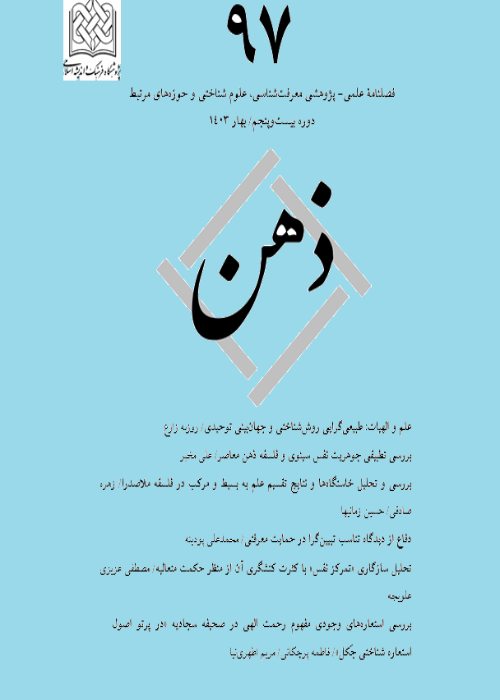A Study of Swinburne's New Recounting of Descartes's Argument on the Originality of the Soul and Its Reconstruction Based on Ibn Sina's Argument of “Floating Man in Space”
Following the principle of "I think, then I am", Descartes put forward an argument to prove the originality of the soul. The contemporary philosopher of religion, Swinburne, after recounting this argument speaks: “This argument only proves that the soul is a 'sufficient condition' for my existence, not a necessary condition”.
The method of discovery in this issue is biblical and the method of evaluation is rational analythic.
Swinburne offers an account of Descartes's Argument, which, in his opinion, also proves the "necessary condition" of the existence of the soul. But this recounting also still faces problems and ambiguities; For, first, the inherent or inseparable nature of "thinking" for the "I" has not been proved; Secondly, in this recounting, the external realization and occurrence of a thing is concluded from the mere conceivability of that thing. This conclusion is incorrect. In this article, Swinburne's recounting is examined analytically, then Ibn Sina's argument "floating man in space" is introduced and then, inspired by what Ibn Sina said in this regard, an argument is proposed to prove the originality of the soul that is safe from the mentioned complication. This argument begins, first, not with the inseparability of "thinking" for "I," but with an evident proposition, that is, "my selfawareness." Secondly, in this recounting, the occurrence of a thing is not inferred from its mere conceivability, but it is based on a situation in which, in certain circumstances, one can actually experience this state in oneself.
Descartes's argument for the originality of the soul, based on the conceivability of the soul without the body, is incomplete. This argument only proves that the soul is a "sufficient condition" for the existence of the "I" and not a “necessary condition”. Swinburne's new recounting of it, although it removes some of the complication involved in it and shows that the soul is also a "necessary condition" for the existence of the "I", leaves some of the complications entered into it; For, first, the inseparability of "thinking" for "I" has not been proved; Secondly, in this argument the external realization and occurrence of a thing is concluded from the mere conceivability of that thing. This conclusion is incorrect. But Ibn Sina's argument "floating man in space" is a precise and profound argument that tries to show the immateriality of the soul and the difference between the soul and the body based on the presential and intuitive knowledge of man. In this article we have shown that Ibn Sina's expression can be reconstructed in a new form and in a stronger argumentative way than Descartes and Swinburne's argument in such a way that it is safe from the fault entered into them. This argument begins, first, not with the inherent nature of "thinking" for "me," but with the evident proposition, "my self-awareness." Secondly, in this argument, the occurrence of a thing is not inferred from the mere fact that it is conceivable, but it is based on a situation in which, in certain circumstances, one can actually experience this state in oneself..
- حق عضویت دریافتی صرف حمایت از نشریات عضو و نگهداری، تکمیل و توسعه مگیران میشود.
- پرداخت حق اشتراک و دانلود مقالات اجازه بازنشر آن در سایر رسانههای چاپی و دیجیتال را به کاربر نمیدهد.


